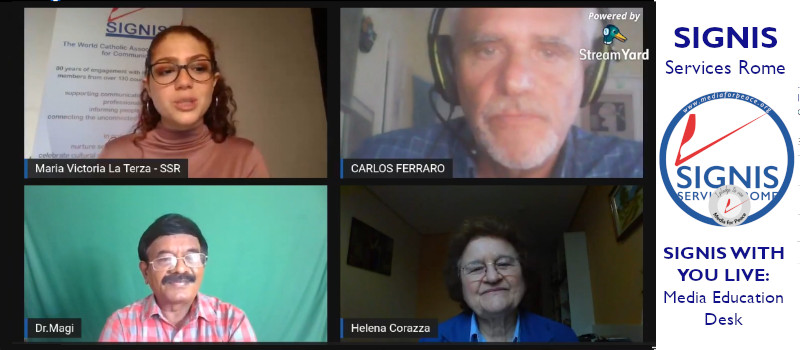Educommunication for the transformation and liberation of the person and society

The work carried out and the projects promoted by the SIGNIS Department of Media Education was the subject of the virtual dialogue that took place on Friday, April 30, at the initiative of the SIGNIS Services office in Rome, and which had the participation of the president of SIGNIS ALC , Carlos Ferraro (Argentina); the director of the Pastoral Service for Communication of Brazil, SEPAC , Sr. Helena Corazza fsp, and Dr. Magimai Pragasam, Vice President of SIGNIS Asia.
In the discussion, Carlos Ferraro explained that the SIGNIS media education department tries to recover the actions that were designed and promoted by all those who preceded in the mission of educating for the media. It also aims to "gather the views of how media education is approached in the world", knowing that there are three main currents that aim to train critical, purposeful and, above all, democratic citizens, such as media education , media literacy , and educommunication , "which is the paradigm that remains in force in Latin America."
As he said, "we understand that all communicators who are the SIGNIS family must go through the educommunicative dimension and the Media Education department promotes actions that allow us to understand that communication has a link with education. That is, to communicate and educate, educate and communicate, which is the interface that the media education department tries to develop.
He explained that the Medudesk web platform is the strategic tool that seeks to bring together "all the experiences that are made in the institution, but also the experiences that are made in media education in different types of institutions that carry out activities similar to those of SIGNIS ".
As he said, on the platform you can find bibliography, conferences, workshops, seminars, congresses, institutional and extra-institutional projects, public policies from various countries to educate citizens in the media. It is a meeting place, for information, but also for projection.
For Ferraro, everyone who works on projects related to educommunication in the world can participate in this Media Education Desk platform. "The platform is in four languages: the three official SIGNIS, Spanish, English and French, and Portuguese, because Brazil, which has a very rich experience in educommunication, cannot be left out."
Educommunication in schools, colleges and universities
Commenting on the most important projects carried out by the SIGNIS Media Education Desk , Dr. Magimai Pragasam highlights that Media Education seeks to introduce educommunication in schools, colleges and universities. As he commented, an educommunication curriculum has been developed for the University of Lean in India, which is a work of the Media Education Desk team. He noted that the program offers a certificate in Christian communication and media education. He also pointed out that a training program in media education has been carried out in Cambodia, with the participation of Pamela Alemán, who taught the subject on media literacy and Carlos Ferraro on educommunication, in which the transformative role of the educommunication, to promote changes in society and the dignity of people and liberation.
He remarked that the Media Education Desk team is committed to continuing to promote training courses in media education, aimed at teachers, pastoral agents, students, animators, young leaders.
Educommunication is much more than media education
For Sister Helena Corazza, a Pauline nun and a doctor in communication, educommunication is a proposal "for dialogue, participation, a lifestyle oriented towards citizenship, transformation of reality. It is not limited to education for the media."
The Brazilian nun, who directs the Pastoral Communication Service, SEPAC, commented that the Church of Brazil has a communication directory that contains a chapter in which "communication is conceived based on three pillars: dialogue , is to say a communication of dialogue, of participation , of a critical position in front of the media and messages, and therefore of training in communication for the empowerment of the person, of the subject so that they become transforming agents ".
He commented that in the SEPAC, the Pastoral Service of Communication, they work a lot in the formation of leaders, in theoretical-practical courses, based on these pillars: of dialogue, of thinking about communication, of producing communication and participation and coexistence with values, since normally people change their thinking, their communication ".
Sr. Corazza also pointed out that he coordinates the educommunication and research sector of SIGNIS Brazil, where the “schools without walls”, which are the media, are beginning to work. He emphasized that the program intends for all radio, print, television and digital media communicators to understand the statement proposed by Mario Kaplún, that all communicators are educators.
He announced that at the moment a project is underway to create a weekly educommunication podcast, communicating with the word of a specialist and sharing educommunicative experiences. Likewise, he pointed out that they want to recover the culture of the pastoral film club, for which they are organizing a course that will begin in June, with four meetings, recovering the audiovisual language, the thought of the church, the tradition about cinema, the analysis. Catholic television stations also show films to think together, because nowadays the cinema is very individual because of the streaming platforms and the possibility of watching it as a community, of thinking together and of taking it into account in the pastoral ones, was lost.
The SIGNIS With You live discussion was moderated by the Venezuelan communicator María Victoria La Terza, from the communication department of SIGNIS Services Rome, SSR.
Editor: SIGNIS ALC






